![]()
![]()
![]()
Use LEFT and RIGHT arrow keys to navigate between flashcards;
Use UP and DOWN arrow keys to flip the card;
H to show hint;
A reads text to speech;
50 Cards in this Set
- Front
- Back
|
isolation |
The process of being blocked from someone or something. |
|
|
adaptation |
a change or the process of change by which an organism or species becomes better suited to its environment.
|
|
|
modernize |
Adapting to the modern way of doing something or having the same ideas and methods. |
|
|
emperor |
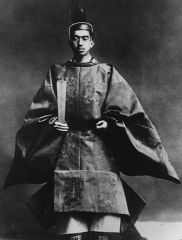
A sovereign ruler of great power and rank, especially one ruling an empire.
|
|
|
daimyo |
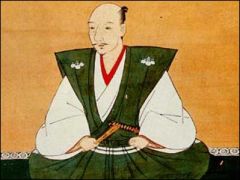
One of the great lords who were vassals of the shotgun in feudal Japan. |
|
|
shogun |
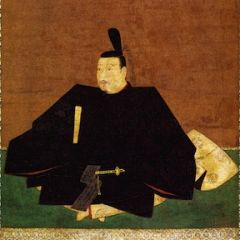
A hereditary commander-in-chief in feudal Japan. Because of the military power concentrated in his hands and the consequent weakness of the nominal head of state (the mikado or emperor), the shogun was generally the real ruler of the country until feudalism was abolished in 1867.
|
|
|
koku |

The koku is a Japanese unit of volume, equal to ten cubic shaku. 1 koku is approximately 278.3 litres.
|
|
|
Bakufu |
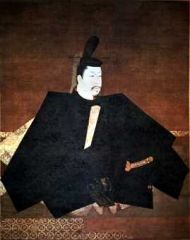
The term
bakufu originally meant the dwelling and household of a shogun, but in time, became a metonym for the system of government of a feudal military dictatorship, exercised in the name of the shogun. |
|
|
edict |
An official or legal order. A command to the public b an authority. |
|
|
Han |
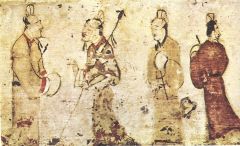
A local government in each domain (province), ruled by daimyo. |
|
|
samurai |
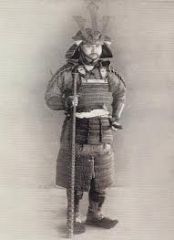
A powerful military caste in feudal Japan, especially a member of the class of military retainers of the daimyos. |
|
|
entourage |
A group of attendants or other people who accompany someone, usually an important person. |
|
|
metropolises |
They are an important place, a capital or a chief city of a country or region. |
|
|
Edo |
A member of a people inhabiting the district of Benin in Nigeria.
|
|
|
Kyoto |
Kyoto is a city located in the central part of the island of Honshu, Japan. It has a population close to 1.5 million. Formerly the Imperial capital of Japan.
|
|
|
Osaka |
Osaka, a large port city and commercial center on the Japanese island of Honshu.
|
|
|
popular culture |
It is the cultural activities that appeal to the current tastes of the general public. |
|
|
opulent |
Very rich, luxurious, or lavish, it also means wealthy. |
|
|
Geisha |
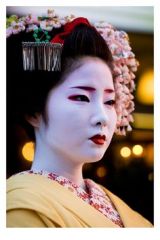
A Japanese hostess trained to entertain men with conversation, dance, and song.
|
|
|
aesthetics |
A set of principles concerned with the nature and appreciation of beauty, especially in art. The branch of philosophy that deals with the principles of beauty and artistic taste.
|
|
|
consensus |
In general, it means agreement.
|
|
|
compromise |
An agreement or a settlement of a dispute that is reached by each side making concessions.
|
|
|
czar |
A person appointed by government to advise on and coordinate policy in a particular area. An emperor of Russia before 1917.
|
|
|
crisis |
A time of intense difficulty, trouble, or danger.
|
|
|
assimilate |
Take in (information, ideas, or culture) and understand fully.
|
|
|
monopoly |
The exclusive possession or control of the supply or trade in a commodity or service.
|
|
|
Commodore Perry |
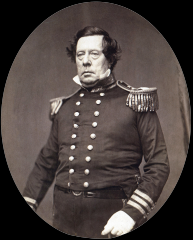
Narrative of the Expedition of an American Squadron to the China Seas and Japan Performed in the Years 1852, 1853 and 1854 under the Command of Commodore M.C. Perry, United States Navy.
|
|
|
inviolable |
It means never to be broken, infringed, or dishonored. |
|
|
regalia |
The emblems or insignia of royalty, especially the crown, scepter, and other ornaments used at a coronation.
|
|
|
coup |
A sudden, violent, and illegal seizure of power from a government.
|
|
|
The Charter Oath |
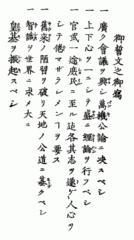
The Charter Oath, more literally, the Oath in Five Articles, was promulgated at the enthronement of Emperor Meiji of Japan on 7 April 1868.
|
|
|
representative government |
An electoral system where citizens vote to elect people to represent their interests and concerns. Those elected meet to debate and make laws on behalf of the whole community or society, instead of the people voting directly on laws and other debates.
|
|
|
democracy |
A system of government by the whole population or all the eligible members of a state, typically through elected representatives.
|
|
|
industrialized |
Developed industries in (a country or region) on a wide scale.
|
|
|
Iwakura mission |
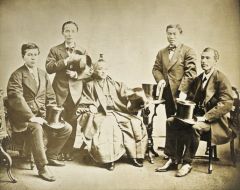
The Iwakura Mission or Iwakura Embassy was a Japanese diplomatic around-the-world voyage conducted between 1871 and 1873 by leading statesmen and scholars of the Meiji period.
|
|
|
constitutional government |
Constitutional government. Constitutional government is defined by the existence of a constitution—which may be a legal instrument or merely a set of fixed norms or principles generally accepted as the fundamental law of the polity—that effectively controls the exercise of political power.
|
|
|
prefecture |
A district under the government of a prefect.
|
|
|
nationalistic |
Having strong patriotic feelings, especially a belief in the superiority of one's own country over others.
|
|
|
liberal |
Open to new behavior or opinions and willing to discard traditional values.
|
|
|
human rights |
A right that is believed to belong justifiably to every person.
|
|
|
conservative |
Holding to traditional attitudes and values and cautious about change or innovation, typically in relation to politics or religion.
|
|
|
Dajokan |
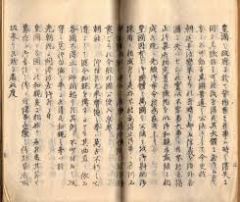
Dajōkan, council of state of the Japanese imperial government during the Nara and Heian periods (710–857).
|
|
|
domestic products |
Gross Domestic Product (GDP) is the broadest quantitative measure of a nation's total economic activity. More specifically, GDP represents the monetary value of all goods and services produced within a nation's geographic borders over a specified period of time.
|
|
|
import tariff |
Definition of import tariff. A tariff on goods coming into a country from abroad, often used by governments as a way of reducing imports and protecting local industries.
|
|
|
national income |
The total amount of money earned within a country.
|
|
|
gunboat diplomacy |
Foreign policy that is supported by the use or threat of military force.
|
|
|
filial |
Of or due from a son or daughter.
|
|
|
Edo period |
The Edo period or Tokugawa period, is the period between 1603 and 1868 in the history of Japan, when Japanese society was under the rule of the Tokugawa shogunate and the country's 300 regional daimyo.
|
|
|
Meiji period |
The Meiji period, also known as the Meiji era, is a Japanese era which extended from September 8, 1868 through July 30, 1912. This period represents the first half of the Empire of Japan during which Japanese society moved from being an isolated feudal society to its modern form.
|
|
|
seppuku |

Ritual suicide by disembowelment with a sword, formerly practiced in Japan by samurai as an honorable alternative to disgrace or execution.
|

